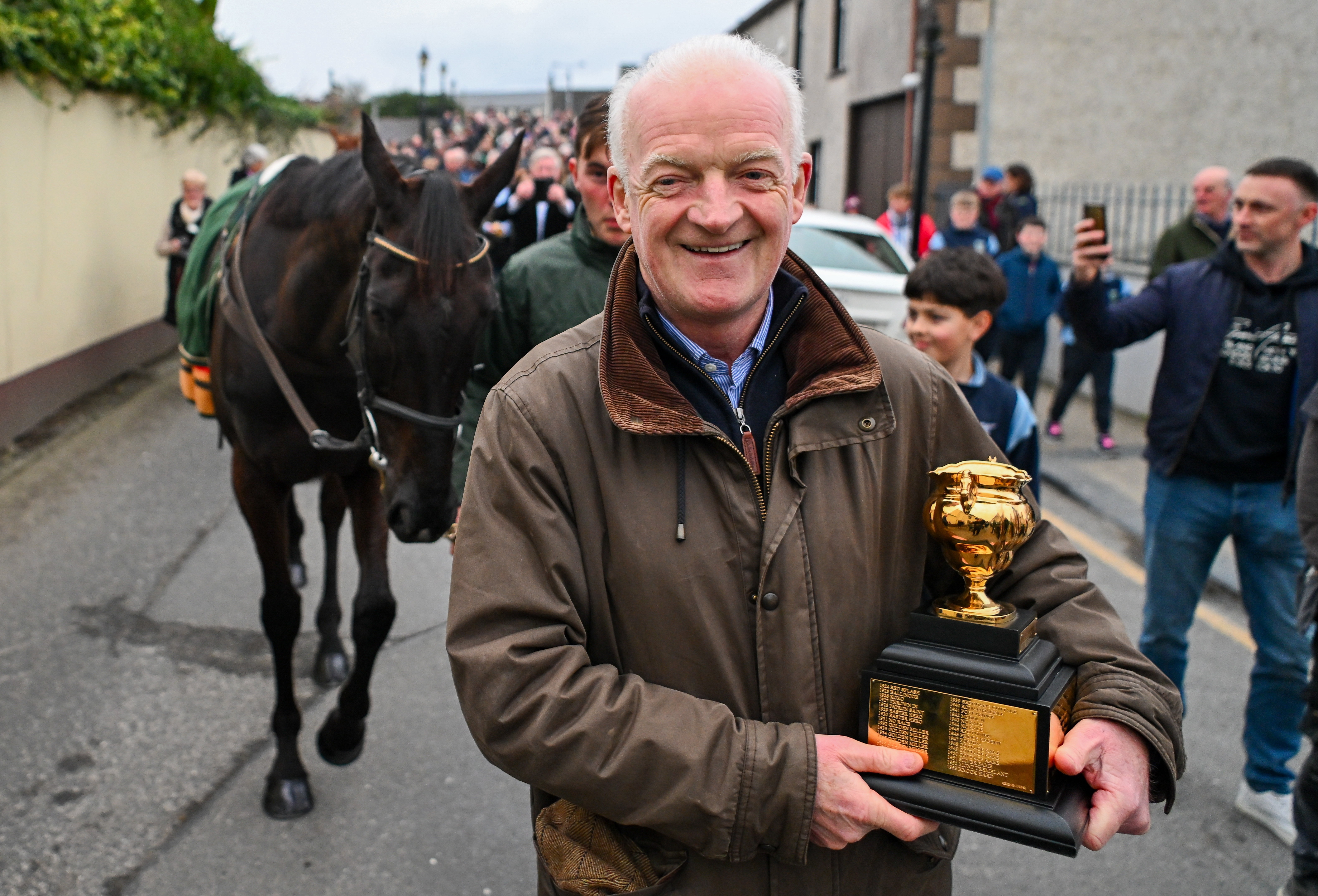'Incredible' Bet Placed on Mr Incredible and Meetingofthewaters
An 'incredible' gambling spree on two Willie Mullins runners for the Grand National has sent shockwaves through bookmakers. William Hill has reported 'significant' amounts of money being wagered on the Irish trainer's entries for the £1 million Aintree showdown.
Punters Flock to Back Mullins' Runners
Mr Incredible and Meetingofthewaters are the center of attention, with punters eagerly backing these talented horses for the prestigious race. Even legendary bettor JP McManus is in the mix, owning Meetingofthewaters after acquiring him just before the Cheltenham Festival.
Market Shifts and Bookies' Reactions
As the anticipation builds, bookies are reacting to the flurry of bets on the Mullins duo. Mr Incredible and Meetingofthewaters have seen their odds shorten, with Mr Incredible now at 12-1 and Meetingofthewaters at 10-1.
Impact of Weather Conditions on Race Participation
The going at Aintree, particularly the soft and heavy conditions, could potentially lead to some horses being withdrawn from the Grand National. Owners like Ronnie Bartlett and Eddie O'Leary are considering their options based on the track conditions.
Grand National Odds and Favorites
As the race day approaches, Corach Rambler leads the pack at 4-1, followed by other contenders like I Am Maximus and Vanillier. The competitive field promises an exciting spectacle for horse racing fans.
Responsible Gambling Reminders
As the excitement builds for the Grand National, it's essential to remember to gamble responsibly. Setting limits, playing within means, and seeking support if needed are crucial steps to ensure a safe and enjoyable betting experience.
Frequently Asked Questions
What health precautions do you need to take when training a horse for racing?
It is important to pay close attention to the health of a racehorse in order for it not be injured or ill. Regular veterinary checks, vaccinations and dental care are important. The horse should also be monitored for signs of discomfort, fatigue or strain. By implementing a training plan that is well thought out and allows for a gradual progression of intensity, you can minimize the risk of injury to your musculoskeletal system.
What is a trainer’s role in training a racing horse?
Jockeys have a crucial role to play in the training of racehorses. The jockeys ride the horses, giving feedback on their performance. They also help to educate the horse in racing tactics, like pacing the horse, positioning it, and responding when given commands. A good jockey becomes attuned to the horse’s strengths and weaknesses, which is indispensable for race preparation.
What’s the best kind of diet for racing horses to follow?
A racehorse’s diet must be high in quality and precisely balanced to meet the energetic demands of training and racing. It generally consists of a combination of high-grade hay, grains such as oats or barley, and commercially prepared feed designed for racehorses. Additionally, the diet should be supplemented with essential vitamins and minerals to support overall health and peak performance.
How often must racehorses receive training?
It is important to tailor the frequency of training a racehorse according to its needs, level and schedule. In general, racehorses will have a daily exercise routine that includes walking, trotting, or cantering. This is followed by more demanding work, like galloping or breezing at least three times a weekly, to improve stamina. Rest days are equally important to allow the horse to recover and prevent overtraining.
What is the first training step for a racehorse?
The first phase of training a racing horse involves “breaking”, where the horse gets used to wearing a saddle and bridle as well as the weight of the rider. During early sessions, the horse must be taught to accept human contact and wear the equipment throughout his racing career.
How important is the pedigree of a racehorse for success?
Although pedigree may be a sign of potential, it does not determine a racehorse’s success. The lineage of a horse may indicate an inherited ability for speed or endurance. However, training, health and temperament can also be influential factors. A horse’s natural ability can be maximized by good training, and it may even outperform horses with impressive pedigrees.
Statistics
- Racehorse mortality rates during racing have been observed to be between 1.5 to 2 deaths per thousand starts, depending on the racing jurisdiction.
- Approximately 70% of a racehorse’s diet consists of forage, with the remainder made up of grains and supplements to meet their high-calorie needs.
- An extensive survey indicated that over 90% of racehorse trainers utilize swimming as a low-impact exercise in their conditioning routines.
- The majority of racehorses in training are subject to an exercise regimen that includes being ridden six days a week.
- Gastrointestinal issues affect up to 90% of racehorses during their training, emphasizing the need for careful dietary management.
- The Injury Database from The Jockey Club reports that synthetic racing surfaces have a lower horse fatality rate than dirt tracks, with a statistically significant difference of 1.2 fatalities per thousand starts on synthetics compared to 2.0 on dirt tracks.
External Links
thoroughbred-racing.net
paulickreport.com
racingpost.com
horseracing.com
grayson-jockeyclub.org
jockeyclub.com
How To
How to Mentally Stimulate A Racehorse While Training
By providing different workouts and environments, you can keep your racehorse mentally engaged and prevent stress and boredom. Implement trail rides and outdoor exercises in addition to track work. Teach the horse new commands and patterns to engage its mind. Establishing a bond between the horse and handler, as well as allowing social interactions with horses of other breeds will help improve mental state. Mentally content horses are more focused and cooperative when training and competing.

